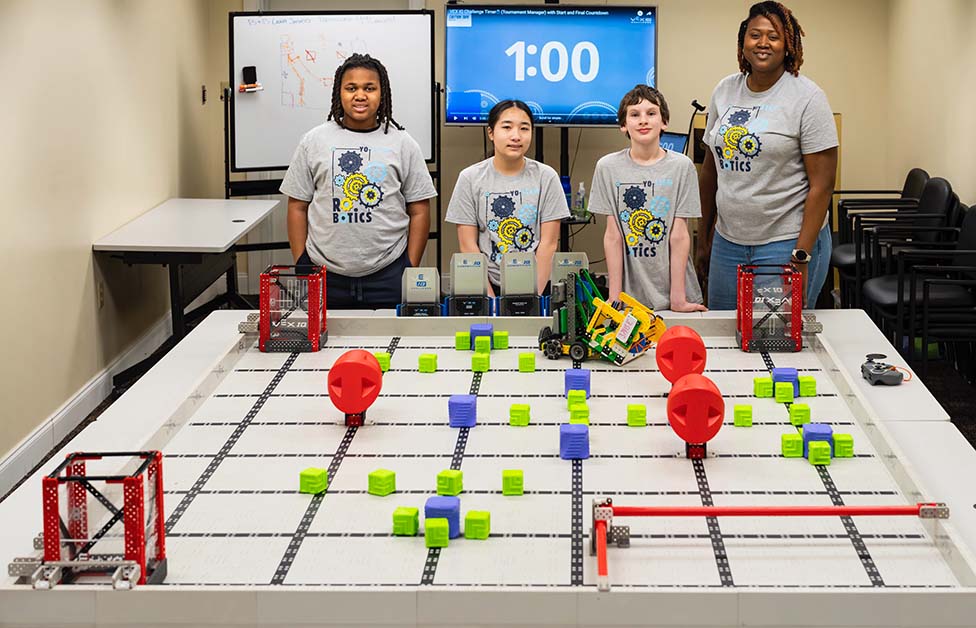Graduate Student Brings STEM Education to Knoxville Youth

Candace Halbert, PhD candidate in the Department of Chemistry, was recognized by People Magazine last year for her work bringing STEM education to underserved Knoxville youth through her nonprofit organization Youth Outreach in STEM (YO-STEM). As a nontraditional student, Halbert is building the skills and knowledge that will allow her to serve her community and benefit the life and lives of children all over Knoxville.
After earning her master’s degree from Georgia Tech, Halbert pursued a career as a chemist and eventually began working as a scientific associate at the Spallation Neutron Source at Oak Ridge National Laboratory (ORNL). Halbert’s role at ORNL quickly expanded beyond managing a research instrument to include recruiting at conferences and career fairs.
As she continued working as a STEM professional, Halbert noticed that she was often the only woman or person of color in the room. She found herself wondering what could be done to change that. In 2016, in the wake of the ongoing water crisis in Flint, Michigan, Halbert stopped wondering and started acting.
“Vine Middle School was collecting water for Flint so I went to donate, and I realized Vine was a STEAM school. I offered to volunteer and a few weeks later they contacted me and asked if I would be interested in starting a STEM program for girls,” said Halbert.
What began as a STEM club for girls, quickly expanded to a co-ed Build-a-Drone program, and in 2017, Halbert founded YO-STEM. YO-STEM is a nonprofit dedicated to providing underserved students with education and hands-on STEM experiences. Its three main programs are the original Girls in STEM program, STEM Saturday, and competitive co-ed Robotics. The first year YO-STEM’s robotics team competed, the made it all the way to the VEX Robotics World Championship.
“Our kids are amazing. All they need is the resources, time, and energy to be devoted to them,” said Halbert. “I always tell people we’re not saving these kids. We are giving them a tool and they’re learning to do everything they need with it. They’re strategizing, they’re practicing, they’re communicating. They’re doing the work; we’re just supplying the opportunity.”
Halbert’s journey to the Department of Chemistry at UT is intimately tied to her work with YO-STEM. Her experience as a working scientist in a national lab led Halbert to believe that a PhD would open new doors for her professionally, but she was hesitant to add graduate school to her existing priorities. As Halbert continued pouring energy into her nonprofit, YO-STEM expanded its services to more students and age brackets. It wasn’t long before one of her colleagues suggested she return to graduate school.
“I was speaking to my mentor and she pointed out how much more I could do for my community with a PhD. All this time friends and colleagues had said I should go back to school because it would help my career, and I knew they were right,” said Halbert. “But my mentor reminded me this degree could do so much more than just help my career, that it could really enable me to better serve my community and these students.”
After joining the PhD program at UT, Halbert quickly realized how different this graduate school experience would be. Some of this she attributed to her professional experience and personal growth, both natural and intentional. However, she also found the program’s focus on research and fostering rigorous scientific inquiry to be a much more effective approach for her as a student.
“This has been a completely different experience for me. As part of an R-1 institution, the structure of the program here focuses on high-quality research and research proposals as measurements of success and ability,” said Halbert. “I think that’s a better way to prepare students for their future careers. The department is also very supportive. I can tell my committee wants me to succeed.”
Now in her third year, Halbert feels confident that she made the right choice to pursue a PhD at UT. She says that balancing her work as a graduate student, her work at ORNL, and her work with YO-STEM has been challenging but rewarding. In the last few years, she has welcomed other members of the chemistry program into the family of volunteers at YO-STEM, and is considering further expanding the organization’s offerings as students ask for additional programs. Halbert has even begun to see some of the earliest participants in her programs joining the Volunteer family as undergraduate students.
One of my students is in computer science and another is in nursing. I love seeing them here at UT. It’s almost like we’ve come full circle,” said Halbert
As Halbert continues to progress through her PhD program, she is looking forward to leveraging the knowledge and skills she has gained at UT to the benefit of both her career and community. She has discovered her passion in STEM advocacy and says the Department of Chemistry has provided her with the invaluable education and experience she needs to become an even stronger advocate.
Learn more about YO-STEM here.